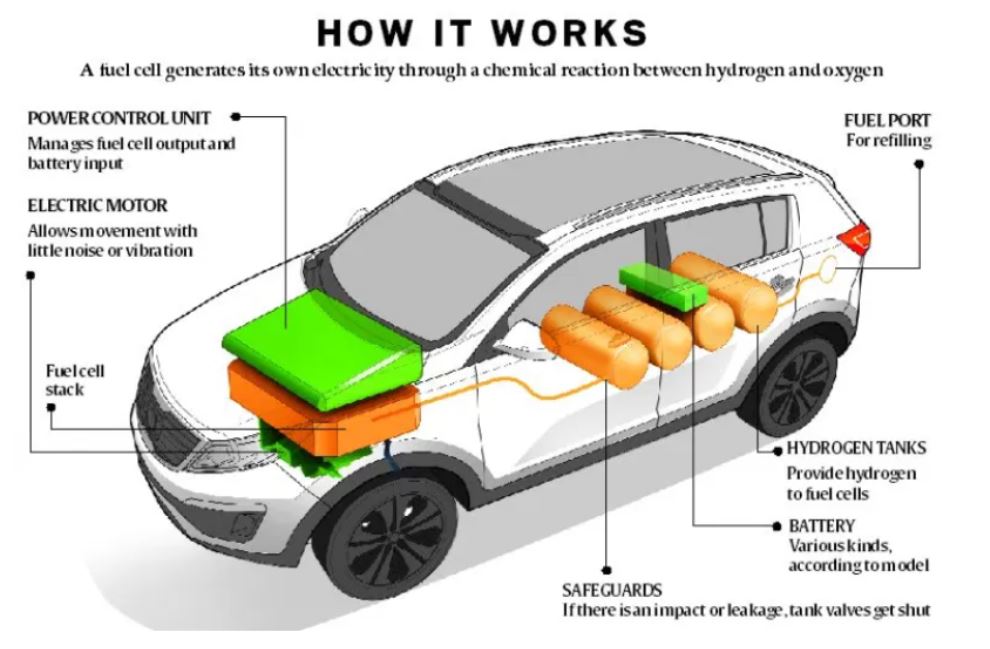The Big Picture- RSTV, UPSC Articles
Hydrogen Fuel Cell for Vehicles
Archives
TOPIC: General Studies 3
- Environment; Science and Technology
In News: Aimed at a significant push for hydrogen vehicles in the country, Ministry of Road Transport and Highways has notified standards for the safety evaluation of hydrogen fuel cell-based vehicles.
Standards for Safety Evaluation 0f Hydrogen Fuel Cell Vehicles
- The motor vehicles of Category M and Category N, running on compressed gaseous hydrogen fuel cell, shall be in accordance with AIS 157:2020, as amended from time to time, till the corresponding Bureau of Indian Standard Act, 2016, specification is notified.
- Also, the hydrogen fuel specification for fuel cell vehicles will be in accordance with ISO 14687.
- They were notified through an amendment to Central Motor Vehicles Rules 1989.
- These standards are also at par with the available international standards.
- This would facilitate the promotion of Hydrogen Fuel Cell based vehicles in India.
- Hydrogen Fuel Cell based vehicles are energy efficient and environment friendly.
The Fuel Cell Technology
A fuel-cell electric vehicle is essentially a hybrid electric vehicle wherein, the internal combustion engine is replaced with a fuel-cell stack. The onboard sources of power include hydrogen as well as an advanced battery system. The hydrogen, stored in its pure form, in high-pressure tanks, is sent through the fuel-cell wherein it is combined with oxygen, resulting in the the production of water (H2O) and electricity. The electricity produced is used directly to drive the vehicle with water being the waste and the only emission through the tail-pipe.
In simple words, unlike a battery-electric vehicle, which needs to be charged from external sources, a fuel-cell electric vehicle produces it’s electricity onboard. This drastically reduces the battery capacity and hence the dead-weight which an FCEV needs to carry.

Picture Source: Indian Express
Hydrogen can be produced through a number of sources, be it thermal, wind, solar, CNG, LNG and the likes. But the most feasible sources of hydrogen, which is also available in surplus, is biomass. India has a huge biomass reserve which is either burnt of simply goes waste. Apart from livestock dung, agriculture and forest residual and sewage sludge are also CO2 free sources from which hydrogen can be obtained. Similarly, by virtue of electrolysis, hydrogen can be produced from the 40 per cent excess electricity available through renewable resources such as wind, water, solar and Geothermal. India’s vast coal reserves can also be used for the due process.
- Like conventional batteries under the bonnets of automobiles, hydrogen fuel cells too convert chemical energy into electrical energy.
- From a long-term viability perspective, FCEVs are billed as vehicles of the future, given that hydrogen is the most abundant resource in the universe.
- Fuel cells have strong advantages over conventional combustion-based technologies currently used in many power plants and cars, given that they produce much smaller quantities of greenhouse gases and none of the air pollutants that cause health problems.
- If pure hydrogen is used, fuel cells emit only heat and water as a byproduct. Such cells are also far more energy efficient than traditional combustion technologies.
- Unlike battery-powered electric vehicles, fuel cell vehicles do not need to be plugged in, and most models exceed 300 km of range on a full tank. They are filled up with a nozzle, just like in a petrol or diesel station.
Criticism/Challenges of Hydrogen Cell Technology
- The process of making hydrogen needs energy — often from fossil fuel sources. That has raised questions over hydrogen’s green credentials.
- Safety — hydrogen, in its pure form, is highly reactive. It is more explosive than petrol.
- High Cost – high cost involved in the production of hydrogen, fuel-cell stacks and establishment of hydrogen fuel stations. The costs involved in the same only go down with technological development along with wider adoption, as is the case with most of the new technologies.
- A lack of refuelling stations, which are costly to build, is usually cited as the biggest obstacle to widespread adoption of FCVs. At the same time, the main reason cited for the lack of refuelling infrastructure is that there are not enough FCVs to make them profitable.
Important value additions:
Hydrogen Fuel
- Hydrogen does not occur free in nature in useful quantities.
- It can be made from natural gas or it can be made by passing electric current through water.
- When hydrogen is burned, it only emits water vapour and carbon dioxide (CO2) is not produced.
- It is more efficient than internal combustion engine.
- However, manufacturing hydrogen fuel based vehicle is still expensive.
Connecting the Dots:
- Are hydrogen-powered fuel-cell electric vehicles the future? Discuss.











